What Women 50+ Want From Financial Advisers: Much More Than Men
Findings from a fascinating survey and insights from 3 experts
Recent research from the Hearts & Wallets financial research firm found that when women and men 50+ were asked what they want from financial advisers and financial services firms, the percentage of women saying they wanted something was far more than men. Those factors deemed more important to women ranged from low fees to a person or team assigned to their account to online account access and tools to clear and useful statements to sharing their values.

The biggest gaps between what women and men told Hearts & Wallets were important to them from advisers and financial firms: “has specialized expertise,” “explains things in understandable terms,” “has been in business a long time” and “is proactive when market changes/when I’m losing money.” (One caveat: Hearts & Wallets only looked at two genders, and some people don't define themselves as men or women.)
Women’s attitudes have been shifting to an “I demand respect and performance” attitude when working with money pros.
“Looking at the data from the past year, we see these findings are true only for older women,” says Hearts & Wallets founder and CEO Laura Varas. “Women forty-four years old and younger are not more demanding than men. For women forty-five and older, it is true, and becomes more pronounced as women grow older.”
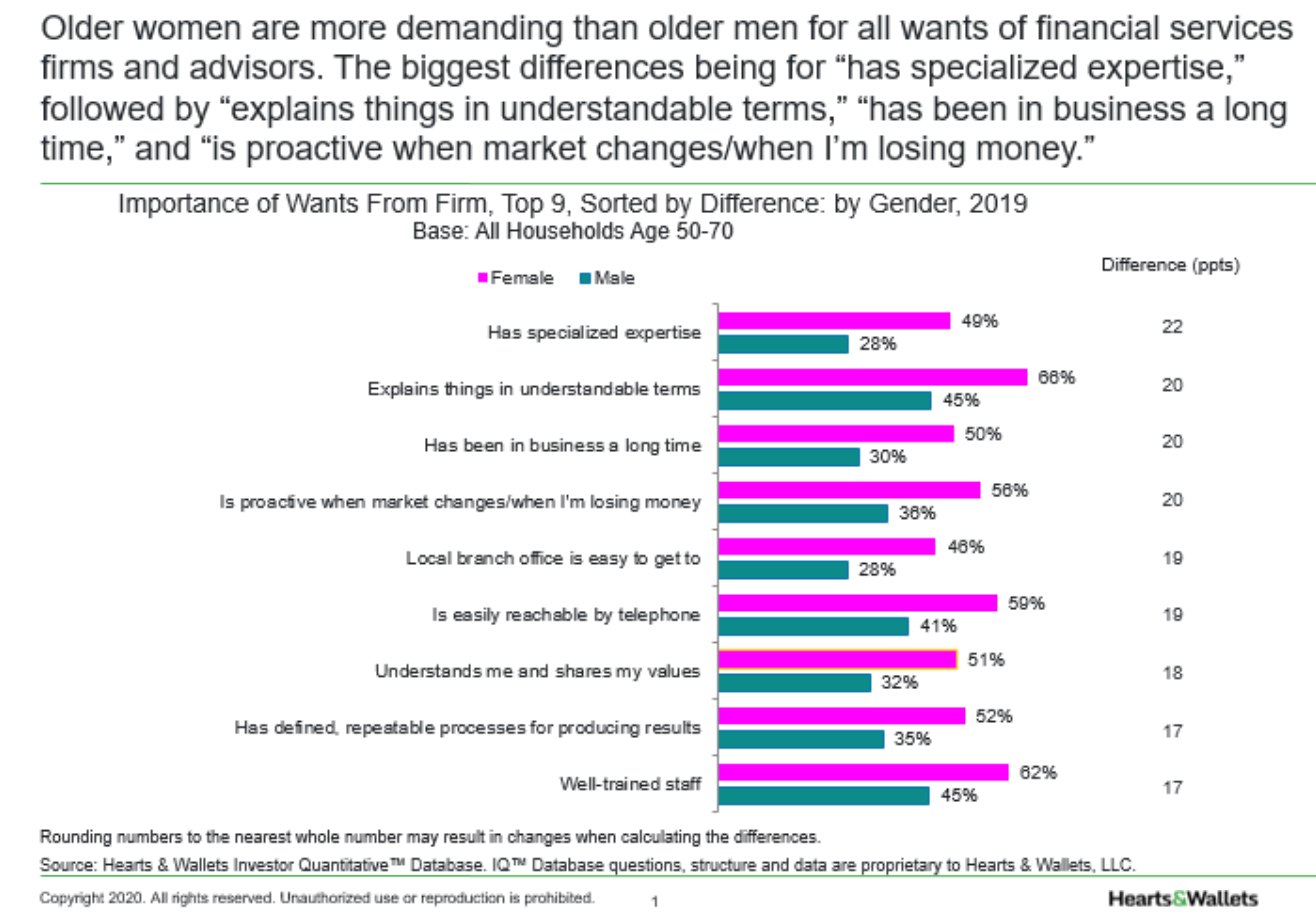
The Importance of Financial Advisers Explaining Things Clearly
There was one exception to that, though. “For women in all age categories, an adviser who ‘explains things in understandable terms’ is rated in higher importance than it is for men,” Varas said.
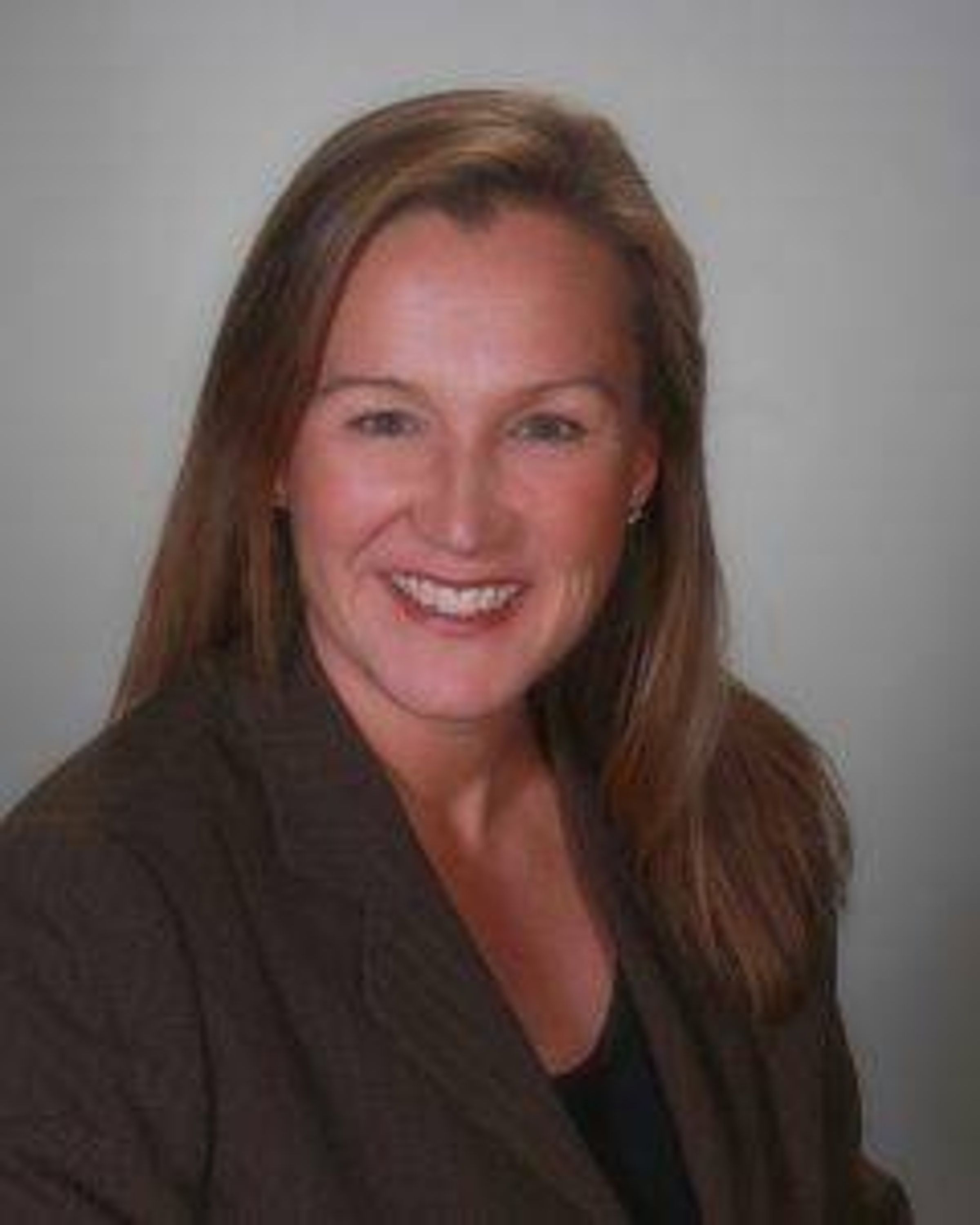
“With age comes experience, and people get more certain about what they want and what’s important to them,” Varas says.
Before I tell you more about what Varas and three other sharp women who are experts about financial advisers had to say about the Hearts & Wallets findings, let me share two new and troubling statistics from the recent Federal Reserve report, The Economic Well-Being of U.S. Households in 2019.
In its survey of Americans, the Fed found that women were less comfortable making investment decisions than men; only 32% percent of women said they were comfortable managing their investments. And women, on average, answered a lower share of financial literacy questions correctly (52%) than men (67%).
Argh.
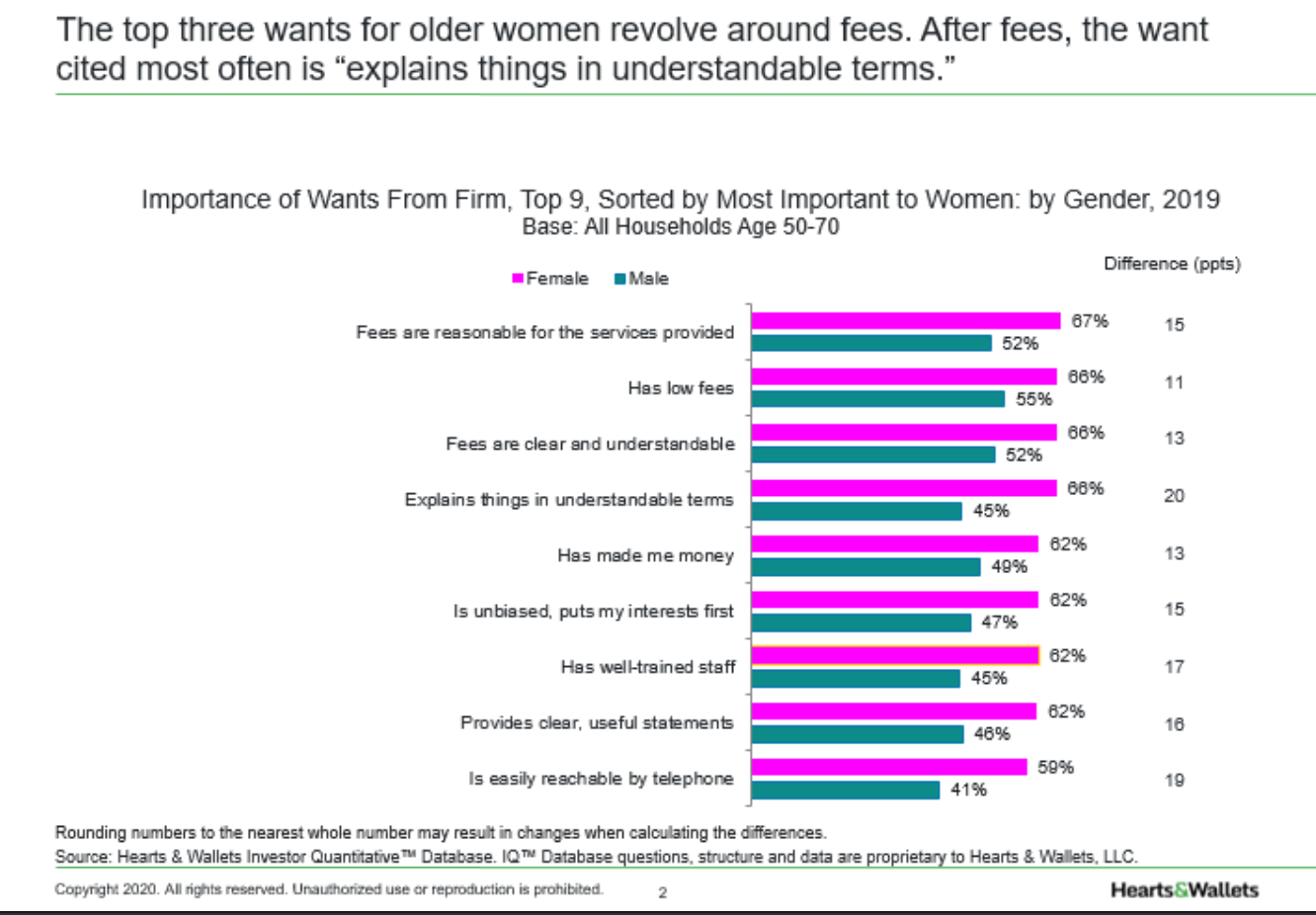
Women and Money: What's Behind the Numbers
In my experience studying and reporting on women and money, I’ve seen similar things. Often, for good reason. The gender pay gap makes it harder for women to have extra money to invest. Then there’s the cultural conditioning that we’re not good at math or investing is boring and simply one more thing to defer to someone else.
But I think the real roadblocks for women, regarding money and working with financial advisers, are being comfortable with the macho investing milieu and with asking questions to financial professionals.
Fortunately, as Hearts & Wallets found, women’s attitudes have been shifting to an “I demand respect and performance” attitude when working with money pros. These days, women who are financial adviser clients or prospects —especially those over 50 — often want more, much more.
Nowadays, as I speak to groups of women about managing their money, solo women regularly ask me how to find an adviser. That’s particularly the case for women over fifty. Having an adviser can be especially helpful during the pandemic, a financially fragile time for many.
Details From the Hearts & Wallets Survey
For a deeper dive into the Hearts & Wallets findings, I asked Varas to unpack some of the results:
For women 45 to 54, “explains things in understandable terms” was the biggest difference between what women and men said they wanted from financial advisory firms. Some 61% of women rated this high in importance vs. just 41% of men.
Similarly, for this age group: “clear and understandable fees” were rated highly important by 66% of women vs. 51% of men. And a “reasonable fee” was deemed highly important by 65% of women compared to 51% of men.
For women 55-64 and women 65+, the biggest gender difference with men was “explains things in understandable terms.” 65% of women 55 to 64 and 67% of those 65+ rated this of high importance vs. 49% of men and 47% of men, respectively.
Women over 55 also felt far more strongly than men about the importance of reasonable fees and clear and useful statements.
Varas said her research also shows the financial confidence of older women over 50 has grown gradually over the past four years.
"In focus groups Age Wave has conducted, women reported feeling invisible to financial advisers."
Insights From 3 Experts
Now for the takeaways from three women and money experts about what is changing for women and financial advisers, as well as what women over 50 should expect from their money pros.
Maddy Dychtwald, a founder of the AgeWave think tank and consultancy, who wrote the study with Merrill Lynch, Women and Financial Wellness: Beyond the Bottom Line:
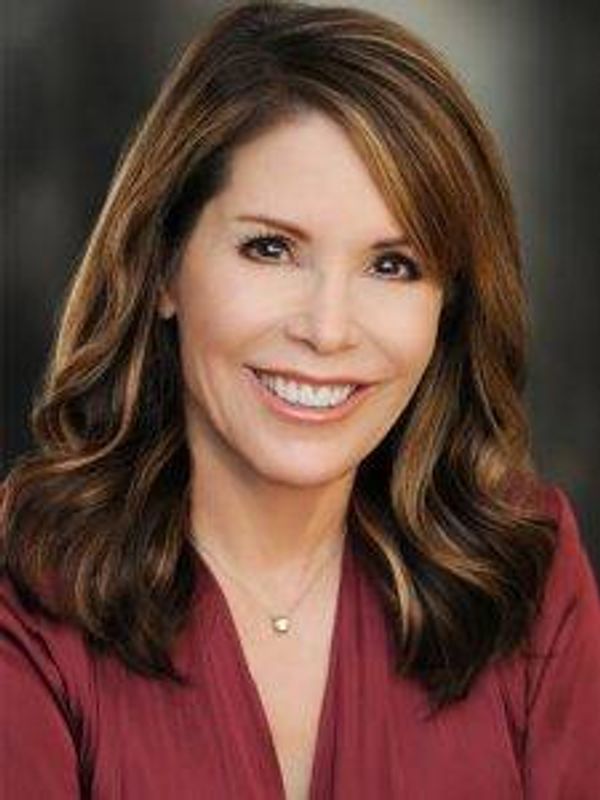
“Women — especially women fifty-plus — have been gradually evolving when it comes to finances and making big financial decisions for themselves and their families. One of the tipping points was the 2008 financial crisis. At that time, many boomer women were routinely deferring big financial decisions to their partner or husband.
When the sky began to fall and came crashing down, many realized they had willingly given up their financial power and that their partner or husband was not necessarily more financially savvy than they were when it came to investing.
It was a moment when many women were determined to learn more and get actively involved in their financial decision-making.
We’re at a similar moment right now.
In the Merrill Lynch study, we learned that the older a woman was, the more likely she was to feel confident in financial investing. This is a relatively new muscle that women are developing that increases with both education and exposure.
Unfortunately, we know that the needle has not moved much when it comes to what women think, or feel, about most financial advisers. In focus groups Age Wave has conducted, women reported feeling invisible to financial advisers.
Women recognize that most financial advisers talk “bulls and bears,” rather than values and priorities. They want the straight scoop, rather than fancy lingo that may often sound like double talk.
This doesn’t mean that women aren’t interested in the bottom line. They most definitely are. But they are also interested in having their investments reflect their values and priorities. For instance, instead of just wanting “their number,” they want to know that they’ll have enough money to send their kids to college or pay for their mom’s care.
Most women want an adviser who doesn’t just listen to her but provides her with feedback that lets her know she’s been heard. Women want customized solutions that make them realize that their financial adviser listened, heard and suggested solutions based on her unique needs and interests.
My advice to women fifty-plus: It might sound trite, but it’s also true — it’s never too late to get started. If you’re fifty or seventy, you still have time to make investments in your financial future.”
Shardea Ages, a partner and Certified Financial Planner at Greenwood Wealth Management in Atlanta:
“Trust is a huge factor for women over fifty. Women want advisers that speak to them in plain language that they can easily understand, enabling them to participate intelligently in the conversation.
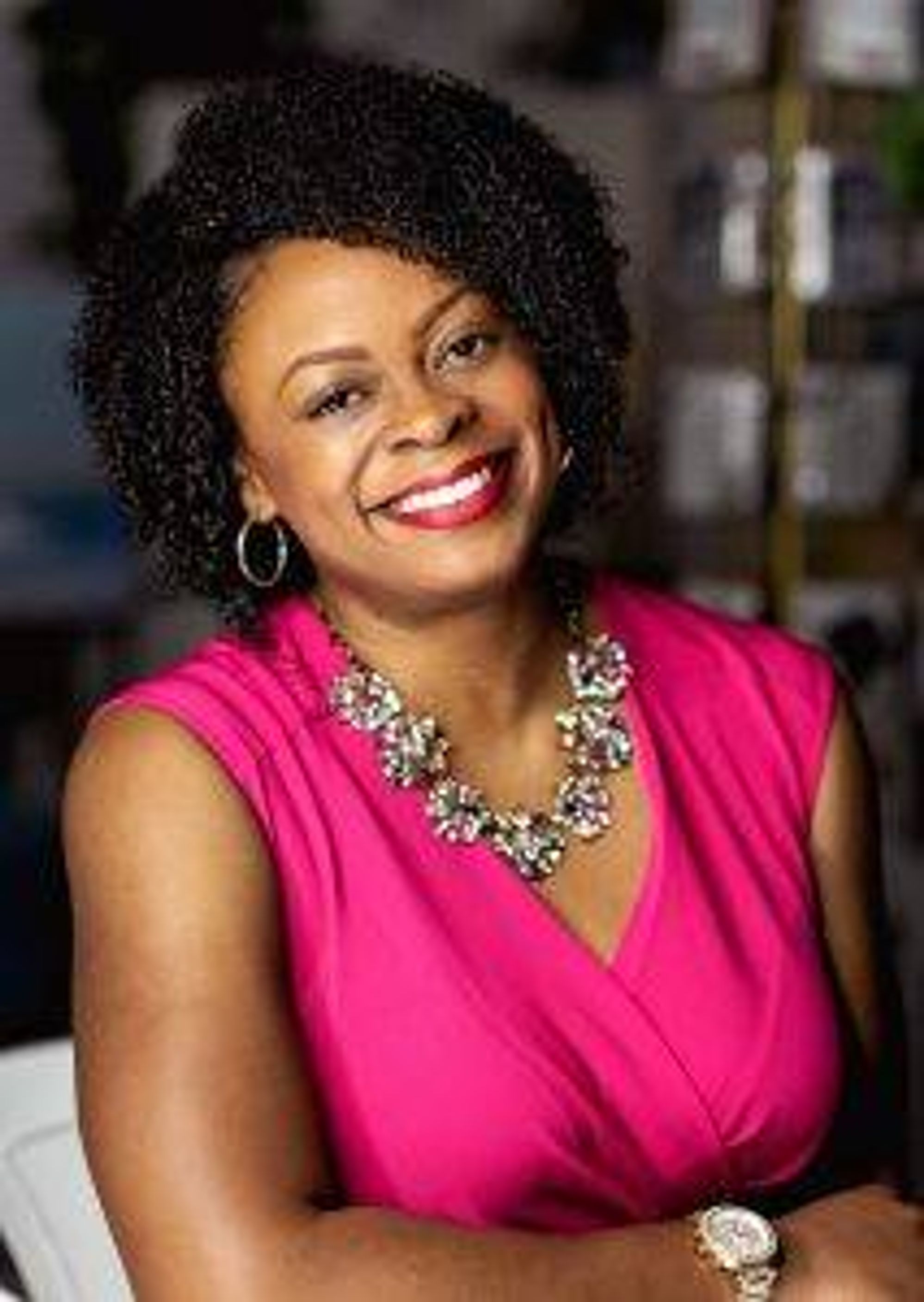
Women over fifty should really take time to interview potential advisers and trust their instincts. During the interview, determine the following:
- Are there shared values?
- Is the adviser really listening to you?
- Are they willing to meet with you at your desired frequency?
- Are there alternative modes of communication — say, virtual meetings, text messaging or email?
While it is always important to give clients permission to ask questions that they may be too embarrassed to ask publicly, it is even more imperative for women over fifty — because the financial implications of discomfort and uncertainty are significantly more expensive."
Cindy Hounsell, president and founder of the Women’s Institute for a Secure Retirement (WISER) nonprofit and a Next Avenue Influencer In Aging:
"Aside from what everyone wants and should expect of an adviser — trust, clarity of fees and understandable language — women worry about having enough money and want to know they are working with someone who understands their lives and listens and respects their judgement. Someone who inspires confidence.
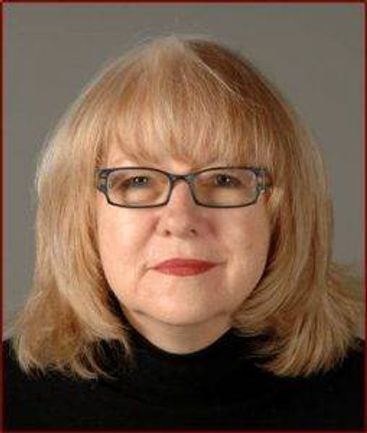
The trust issue goes way beyond the fees. It’s about knowing what women are up against; the invisible side of a woman's life that likely requires hours of caregiving and worrying about older and younger family members and organizing the home life and trying to keep the balance.
Women are likely worried about their own future care needs and being prepared for long-term services. Or various life “shocks” — is there a sibling, friend or grandchild who will need financial help?
Women want an adviser who asks: ‘Aside from your own financial security, what are your biggest concerns? Are there unexpected financial consequences that worry you? Let's plan and collaborate on options that address your concerns, such as claiming Social Security later and working longer.’”


